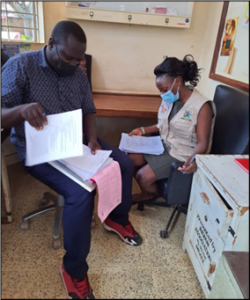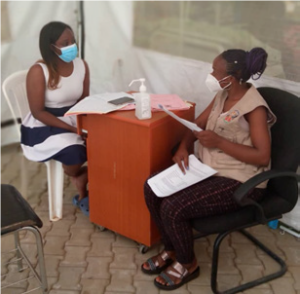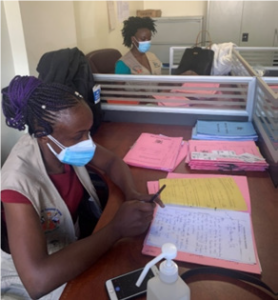 |
Nampeera RoseMBChB (MUK), MCEB (MUK) Host Site: Uganda Cancer Institute (UCI)Host Mentor:Dr. Nixon Niyonzima,, Dr. Noleb Mugisha, |
||||
ABOUT THE FELLOWNampeera Rose holds a Master of Clinical Epidemiology and Biostatistics and a Bachelor’s degree in Medicine and Bachelor’s degree in surgery from Makerere University. Before joining the Fellowship program Rose worked for the Ministry of Health as an epidemiologist in COVID-19 pandemic response. During her time as a Field epidemiology fellow, she was attached to the Uganda Cancer Institute where she gained skills/experience in community cancer screening and sensitization, leadership and public health response. The fellowship program has enabled Rose to gain technical expertise in field epidemiology skills that include: outbreak detection, investigations and response, evaluation of public health surveillance systems, project development and implementation, leadership and management, capacity building, scientific writing and communication skills. Achievements at the Host Site
Fellowship program specific achievementsOutbreak investigation and other projects
Epidemiological bulletins
Newspaper articles in the New Vision
Conference presentations
Summary of Epidemiological Study:Title: Factors associated with death among hospitalized COVID-19 patients in Mulago Hospital, Uganda Dec 2021 – Jan 2022 Background: On 7 December 2021, the first SARS-CoV-2 Omicron variant was confirmed in Uganda. By 14 December 2021, COVID-19 cases had risen sharply in Uganda’s third wave of COVID-19 cases, largely driven by the Omicron variant. Analysis of hospitalized patients in the first and second waves of COVID-19 in Uganda identified age and male sex to be associated with death. We described factors associated with death among hospitalized patients with COVID-19 in Mulago Hospital during W3 of the COVID-19 pandemic in Uganda. Methods: We retrieved treatment files for all hospitalized patients with confirmed SARS-CoV-2 infection at Mulago Hospital in Kampala, Uganda from 14 December 2021 to 14 January 2022. We extracted data on age, sex, vaccination status, underlying conditions, and severity of COVID-19 disease, and interviewed patients or next-of-kin to obtain additional information. We used modified Poisson regression to identify factors associated with mortality. Results: Among 206 patients, 112 (54%) were females and median age was 53 years (range, 0-98 years). In total, 127 (62%) had comorbidities, 38 (18%) were fully vaccinated (≥2 doses of SARS-CoV-2 vaccine), and 40 (20%) died. The median age of persons who died was 63 years (range, 23-88 years), compared with 51 years (0-98 years) in survivors. Seven (18%) persons who died were fully vaccinated, compared with 31 (19%) survivors (OR=0.90, 95%CI=0.43-1.9). Compared to patients aged 0-40 years, the odds of death were 4.1 (95%CI 1.4- 12) times higher among patients aged 45-65 years and 4.4 (95%CI 1.6-12) times higher for patients aged ≥66 years. The presence of comorbidities was not associated with death. Conclusion: Among persons hospitalized with COVID-19 in Uganda’s third wave of infections, only increasing age was associated with death. There is need to continue to emphasize COVID-19 prevention and appropriate care for COVID-19 among older persons and continue studying new variants of COVID-19 independently. Key lessons learnt during the fellowship
Next Steps
Pictorial
|
|||||
Sign in
Sign in
Recover your password.
A password will be e-mailed to you.




